| Listing 1 - 10 of 206 | << page >> |
Sort by
|
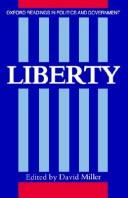
ISBN: 0198780419 9780198780410 Year: 1991 Publisher: Oxford: Oxford university press,
Abstract | Keywords | Export | Availability | Bookmark
 Loading...
Loading...Choose an application
- Reference Manager
- EndNote
- RefWorks (Direct export to RefWorks)
Liberty --- Civil liberty --- Emancipation --- Freedom --- Liberation --- Personal liberty --- Democracy --- Natural law --- Political science --- Equality --- Libertarianism --- Social control
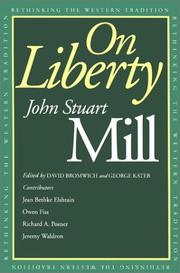
ISBN: 0300096100 9780300130164 0300130163 1281722499 9781281722492 9780300096088 0300096089 9780300096101 9786611722494 6611722491 Year: 2003 Publisher: New Haven : Yale University Press,
Abstract | Keywords | Export | Availability | Bookmark
 Loading...
Loading...Choose an application
- Reference Manager
- EndNote
- RefWorks (Direct export to RefWorks)
Since its first publication in 1859, few works of political philosophy have provoked such continuous controversy as John Stuart Mill's On Liberty, a passionate argument on behalf of freedom of self-expression. This classic work is now available in a new edition that also includes essays by distinguished scholars in a range of fields. The book begins with a biographical essay by David Bromwich and an interpretative essay by George Kateb. Then Jean Bethke Elshtain, Owen Fiss, Judge Richard A. Posner, and Jeremy Waldron present commentaries on the pertinence of Mill's thinking to current debates. They discuss, for example, the uses of authority and tradition, the shifting legal boundaries of free speech and free action, the relation of personal liberty to market individualism, and the tension between the right to live as one pleases and the right to criticize anyone's way of life.
Liberty. --- Liberty --- Civil liberty --- Emancipation --- Freedom --- Liberation --- Personal liberty --- Democracy --- Natural law --- Political science --- Equality --- Libertarianism --- Social control
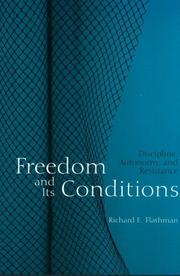
ISBN: 0415945623 9781136784224 1136784225 9780203825099 0203825098 0415945615 9780415945615 9780415945622 0429238223 1283969564 9781136784170 9781136784217 1136784217 9780429238222 9781283969567 Year: 2003 Publisher: New York : Routledge,
Abstract | Keywords | Export | Availability | Bookmark
 Loading...
Loading...Choose an application
- Reference Manager
- EndNote
- RefWorks (Direct export to RefWorks)
Can any of us ever really be free? Do we follow the rules our society gives us because we want to, or because we are forced to? Discipline, Freedom, Resistance challenges the received wisdom that discipline and freedom are opposite and mutually exclusive. Though it is typically argued that a well-ordered liberal society must discipline its more unruly citizens to maintain freedom for all, Flathman shows how resistance to rules can mean more than criminals breaking laws. Resistance can also mean political protest and political dialogues about what the rules can be. Discipline, Freedom, Resi
Liberty --- Liberty. --- Philosophy. --- Civil liberty --- Emancipation --- Freedom --- Liberation --- Personal liberty --- Democracy --- Natural law --- Political science --- Equality --- Libertarianism --- Social control
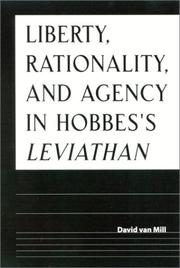
ISBN: 0791450368 079145035X 9780791450352 9780791450369 0791490297 9780791490297 Year: 2001 Publisher: Albany, New York : State University of New York Press,
Abstract | Keywords | Export | Availability | Bookmark
 Loading...
Loading...Choose an application
- Reference Manager
- EndNote
- RefWorks (Direct export to RefWorks)
Marking a significant departure from most scholarship on Hobbes, this book offers new interpretations of his theories of freedom, agency, rationality, morality, psychology, and politics. Hobbes's arguments concerning many different aspects of civil society and human psychology are brought together to provide a comprehensive theory of agency. Hobbes's theory of freedom is demonstrated to be considerably more complicated than previously thought, revealing a concern with both "internal" and "external" conditions of action. On close examination Hobbes can be seen to move beyond his limited definition of negative liberty and to champion autonomous rational action. Throughout, the book evaluates the relevance of this reformulation for contemporary debates in political philosophy.
Liberty --- Civil liberty --- Emancipation --- Freedom --- Liberation --- Personal liberty --- Hobbes, Thomas, --- Democracy --- Natural law --- Political science --- Equality --- Libertarianism --- Social control --- Liberty.
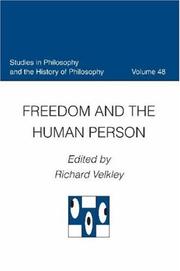
ISBN: 0813221013 9780813221014 9780813215082 0813215080 Year: 2007 Volume: v. 48 Publisher: Washington, D.C. : Catholic University of America Press,
Abstract | Keywords | Export | Availability | Bookmark
 Loading...
Loading...Choose an application
- Reference Manager
- EndNote
- RefWorks (Direct export to RefWorks)
Liberty. --- Civil liberty --- Emancipation --- Freedom --- Liberation --- Personal liberty --- Democracy --- Natural law --- Political science --- Equality --- Libertarianism --- Social control --- Liberty --- Philosophical anthropology
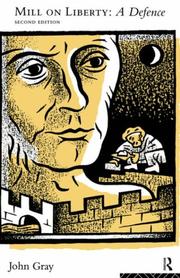
ISBN: 1134802870 1280157402 0203432479 0203291239 9780203291238 9780203432471 0203740718 9780203740712 0415124743 9780415124744 9781134802876 9781280157400 9781134802821 9781134802869 9781138834125 1134802862 Year: 1996 Publisher: London ; New York : Routledge & K. Paul,
Abstract | Keywords | Export | Availability | Bookmark
 Loading...
Loading...Choose an application
- Reference Manager
- EndNote
- RefWorks (Direct export to RefWorks)
Mill on Liberty was first published in 1983 and has become a classic of Mill commentary. The second edition reproduces the text of the first in full, and in paperback for the first time. To this, John Gray adds an extensive postscript which defends the interpretation of Mill set out in the first edition, but develops radical criticisms of the substance of Millian and other liberalism.
The new edition is intended as a contribution to the current debate about the foundations of liberalism, and it looks closely at the recent seminal contributions to liberal thought by Raz, Feinberg, R
Liberty. --- Civil liberty --- Emancipation --- Freedom --- Liberation --- Personal liberty --- Democracy --- Natural law --- Political science --- Equality --- Libertarianism --- Social control --- Mill, John Stuart,
Book
ISBN: 177541065X 9781775410652 9781775410652 Year: 1909 Publisher: [Auckland, New Zealand] : The Floating Press,
Abstract | Keywords | Export | Availability | Bookmark
 Loading...
Loading...Choose an application
- Reference Manager
- EndNote
- RefWorks (Direct export to RefWorks)
At the time it was published in 1859, John Stuart Mill's
Liberty. --- Civil liberty --- Emancipation --- Freedom --- Liberation --- Personal liberty --- Democracy --- Natural law --- Political science --- Equality --- Libertarianism --- Social control
Book
ISBN: 162894059X 9781628940596 9781628940572 1628940573 9781628940589 1628940581 Year: 2014 Publisher: New York : Algora Publishing,
Abstract | Keywords | Export | Availability | Bookmark
 Loading...
Loading...Choose an application
- Reference Manager
- EndNote
- RefWorks (Direct export to RefWorks)
The notion of 'freedom' is essential to America's view of itself as a democratic and individual-based society. In this philosophical dialogue, characters assess the many facets, implications and apparent contradictions inherent in this deceptively complex idea. Seventy-nine short segments provide food for thought even in stolen moments of reading pleasure. The book sparkles with intellectually stimulating views. Drawing on the tradition of the Platonic dialogue, On Freedom explores what freedom is and what it means through the discussions of two characters (Director and Friend). Topics include
Liberty. --- Civil liberty --- Emancipation --- Freedom --- Liberation --- Personal liberty --- Democracy --- Natural law --- Political science --- Equality --- Libertarianism --- Social control
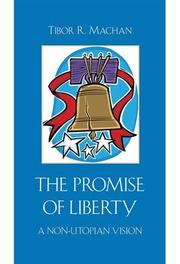
ISBN: 1282493493 9786612493492 0739130765 9780739130766 9781282493490 9780739130742 0739130749 Year: 2009 Publisher: Lanham, MD : Lexington Books,
Abstract | Keywords | Export | Availability | Bookmark
 Loading...
Loading...Choose an application
- Reference Manager
- EndNote
- RefWorks (Direct export to RefWorks)
The fully free society is but a promise, rarely completely fulfilled but clearly a possibility, not a utopia. This work shows both the promise and why it can be reasonably well fulfilled.
Liberty --- Liberty. --- Civil liberty --- Emancipation --- Freedom --- Liberation --- Personal liberty --- Democracy --- Natural law --- Political science --- Equality --- Libertarianism --- Social control --- Philosophy.
Book
ISBN: 1868149730 9781868149735 9781868149728 1868149722 Year: 2016 Publisher: Johannesburg Wits University Press
Abstract | Keywords | Export | Availability | Bookmark
 Loading...
Loading...Choose an application
- Reference Manager
- EndNote
- RefWorks (Direct export to RefWorks)
On a 'cold and starless night' a young pregnant widow, Nandi, arrives in Tin Town, a bleak, drought-stricken place ruled by silence and fear. Little do the inhabitants know that Nandi is carrying the baby who will, in time, change that. Taken in by Mkhulu (grandfather), whose father established the tin bucket factory that gave the town its name, Nandi gives birth to Nomvula, the Little Drummer Girl. Mkhulu remembers a past when 'people were free to sing and dance', when the rain came and the townsfolk held up their tin buckets to catch the precious, life-giving drops. And then came the Silent Sir and his spokesman, the Censor, and the town went silent. As the singing and dancing and drumming dried up, so did the rain. The tin bucket factory closed, taking with it the life and purpose of Tin Town's inhabitants. Only the Little Drummer Girl can bring back that life, but at enormous personal cost. In Tin Bucket Drum, Neil Coppen achieves a small miracle. Through his lyrical script and the creative use of lighting and sound, one woman, the Narrator, succeeds in evoking a host of characters as this allegorical tale of oppression and liberation plays itself out. It is a story that offers a host of lessons for many places and many times.
Liberty --- Civil liberty --- Emancipation --- Freedom --- Liberation --- Personal liberty --- Democracy --- Natural law --- Political science --- Equality --- Libertarianism --- Social control
| Listing 1 - 10 of 206 | << page >> |
Sort by
|

 Search
Search Feedback
Feedback About UniCat
About UniCat  Help
Help News
News